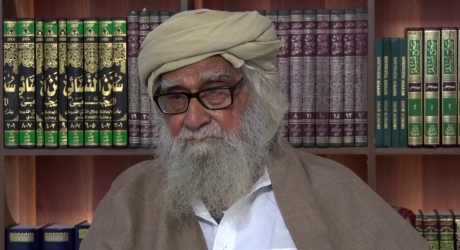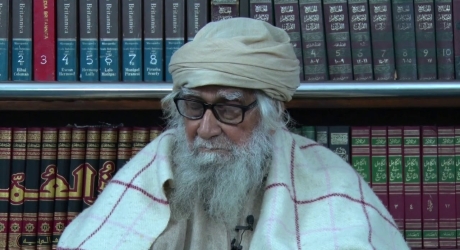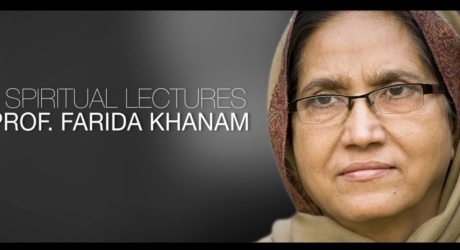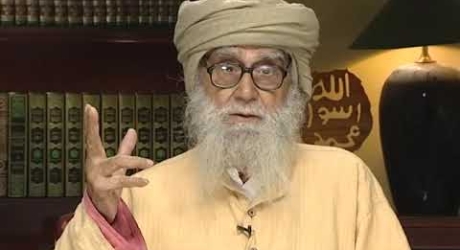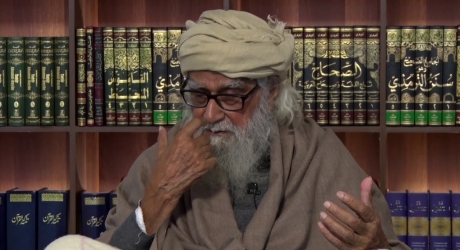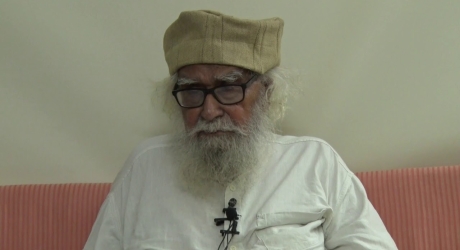The mission of Muslims is dawah or the communication of the Word of God. It is in its performance that they will be held deserving of being raised in the Hereafter as the followers of the Prophet of Islam. This is expressed in the following verse of the Quran:O Messenger, deliver whatever has been sent down to you by your Lord. If you do not do so, you will not have conveyed His message. (THE QURAN 5: 67) Although this verse is addressed to the Prophet Muhammad, his followers are included in it. The first thing that this verse tells us is to convey the divine revelations to the people. This is the task which God wants Muslims to perform.
Bismila-hir Rehman-ir Raheem. (In the name of God, the Most Beneficent, the Most Gracious.)
Today I will talk about the importance of Dawahwork. Dawahwork is the responsibility of Muslims; therefore I will talk with reference to Muslims and how dawah is obligatory for them. According to my understanding of Islam, I feel that Dawah or Tabligh is obligatory (Farz) upon Muslims, just as Namaz, Roza are Farz on them. It is equally a major risk to leave Dawahwork as it is by leaving Namaz, Roza, and Zakat etc. I can say with certainty that it is a major sin not to do Dawahwork.
Why do Muslims not do Dawahwork?
The concept of Dawahwork has been taken away from the psyche of Muslims for almost a thousand years now. Let us understand why.
In Quran, the word ‘dawah’ is used only to depict the passing of the message of God to non-Muslims. But Muslims consider other things such as teaching Namaz to Muslims as Dawahwork, whereas this is clearly Community work and not Dawahwork. They are doing all sorts of things even militancy - in the name of Jihad, and terming it as Dawahwork. These things are definitely not Dawahwork.
As per Quran, only the passing of the message of God to non-Muslims is Dawahwork.
Their case is therefore a case of negative marking in examinations. For example, a student in a school examination is asked to describe an airplane. If he would get 10 marks for a right answer, negative marking means that for a wrong answer, his 10 marks would be deducted. So, if the child instead of describing an airplane describes a car, then instead of obtaining 10 marks, his 10 marks would be deducted. The student would get negative marking as he did not know what an airplane is and also did not know what a car was.
This is the case of today’s Muslims. They are a case of negative marking. They do not know what Dawahwork is and moreover, consider community work to be Dawahwork. This situation is just like that of the above child who neither knows what an airplane is nor what a car was. This is a very serious matter.
I will give you another example to explain this further. An Arabic author wrote a book: “What has the world lost by the decline of Muslims?”
It can be clearly seen from the title of the book, the Muslims are thinking about others. According to me, this is a case of ‘opposite thinking’. At the time of decline, Muslims should be doing introspection instead of worrying about others. The right name for this book should have been: “What have Muslims lost by not doing Dawahwork?”
God’s promise to those who do Dawahwork
According to Quran (5:67), God says while addressing to the Prophet:
Oh Prophet! Send the Message that has been sent through you to the people. God will save you.
When the Quran addresses the Prophet, it also addresses all mankind through the Prophet. Therefore, the above verse of the Quran is saying that God has reduced Momin or addressor’s (dai’s) work by half and taken it upon Himself. Let’s see how:
1. Man’s (Momin’s) job is to pass God’s message and
2. God in turn takes care of man’s worldly issues.
This is a very important thing. When man becomes a representative of the Supreme Power, he comes under His shelter.
Let us understand this with the help of an example. During one of the riots in India, the Government sent a peace mission all over India. I also participated in this peace mission. Where ever the people involved in the peace mission went, a Government representative was deputed to pick them up, take them to their place of residence, take them to other places and take care of everything for them.
We can say that when the representatives of the peace mission went to do a job for the Government, the entire facilities or the infrastructure of the Government came to their aid. It was an undeclared understanding: You take care of our peace mission and we will take care of everything else.
When it comes to Dawah Mission, it the same understanding that applies between man and God. When a Momin gets up to do Dawahwork, he comes under the guarantee of God – angels are deputed to come to his aid.
Therefore the following Ayat of the Quran comes true: God will definitely help those who help Him.
What is Dawahwork?
A believer, immediately upon accepting Islam becomes an Addressor or a Dai and must then carry out Dawahwork. He needs to addresses his Addressee or Madu and tell them about the purpose of their life and what will happen to them after death (in the wisest possible manner.) This is known as Dawahwork.
Are the Muslims of today doing Dawahwork?
Let us look at what the Muslims are doing in the world today. Muslims all over the world are fighting with non-Muslims. At some places, they are fighting aggressive wars; at other places they are fighting media wars; and still at other places, they are fighting ideological wars.
As per my study, all Muslims are thinking negatively, writing negatively, acting negatively against Non-Muslims. They however are not doing Dawahwork.
In my writing for decades, I have written about the Importance of Dawah for Muslims and how it is their responsibility since no more Prophets would come to convey the message of God to humanity. Therefore, as against a confrontational approach that they are following, I have repeatedly written that Muslims need to follow the Hudaibya policy in this regard.
What is Hudaibya policy?
When the Prophet of Islam started his dawah mission in Mecca, only a few people came into the fold of Islam. The majority of the people did not listen. Some even went to the extent of creating hurdles for him and his companions. Things came to such an abysmal state that the Quraysh of Mecca wanted to kill the Prophet.
In order to avoid a confrontation, the Prophet peacefully migrated to Medina. Even in Medina, the Quraysh did not leave the Prophet and his companions alone. They attacked them on numerous occasions. Most of the times, the Prophet of Islam was able to avoid a confrontation except for three occasions - Badr, Uhud and Hunayn, the skirmishes that lasted only half a day each. Therefore, we can say that the Prophet of Islam was able to avoid direct confrontations except for 1 ½ days in his entire life.
The Prophet, realizing that this was not allowing Dawahwork to continue, decided to go to Mecca with 1500 of his companions to circumambulate the Kabah on the occasion of Umrah al-Hudaybiyya in 629 A.D. The incidents of this journey provide a very clear historical example of how the Prophet of Islam paved the way for the furtherance of peaceful Dawahwork.
The Quraysh stopped the Prophet and his companions from going to Mecca at Hudaibya. During that time, the Prophet started negotiations with them. The Quraysh representatives used to come and discuss about peace with the Prophet and his companions but however continued their aggressive attitude and made unnecessary demands. After negotiations that lasted 2 weeks, the Hudaibya peace treaty was drafted. On this occasion, the Prophet of Islam brought matters to a successful conclusion by unilaterally accepting all the conditions of his opponents. In this peace treaty, the Prophet had not apparently received justice or his rights. He however did manage to effect a 10-year no-war pact.
This 10-year no-war pact gave the Prophet and his companions an opportunity to work uninterruptedly on a constructive programme, which would otherwise have been impossible. Dawahwork was able to continue unhindered during this time and within a matter of 2 years, the number of people in the fold of Islam rose to 10,000. By means of this peaceful non-political programme the Prophet and his companions were able to consolidate themselves so thoroughly that they had no need to wage war: in two years, a 10,000 strong group simply marched into Mecca, where their opponents were left with no option but to surrender and Fatah Mecca took place without any fighting. This was the result of peaceful Dawahwork.
We can understand from this that a dawah mission cannot afford wars and violent confrontations. When the normal atmosphere is upset, the circumstances, which foster intellectual movements and spiritual reformation, are affected. Therefore, Dawahwork needs peaceful circumstances to produce a favourable environment for the spread of Islam, while violent circumstances inevitably result in antagonism towards Islam.
The need of the hour: to follow the Hudaibya policy
In the Muslim world of today, we see complaints and confrontations everywhere. What the Muslims need to do is to realize that they are Addressors and therefore need to unilaterally stop all complaints against and confrontations with the Addressees and create a peaceful atmosphere that will allow the propagation of Dawahwork.
To remind the Muslims about this, I have written books and published articles in various Urdu, English, and Arabic media. However, what amazes me the most is that the entire Muslims world became against me, saying that this was cowardice; their opponents would become aggressive; how could they compromise? How could they unilaterally agree to all their points?
I thought for many years why this happened. While the example of the Prophet of Islam was available for all to see, why did the Muslims of today disagreed to it and reacted in such a negative manner to my words? While the Prophet of Islam and his companions had agreed to this policy, why did today’s Muslims deny it? Finally, I realized that it was actually the difference in their psyche that made them react differently from the Prophet and his companions, in spite of being in the same situation.
What was the difference in the psyche?
As per the Quran, the Prophet of Islam was a Dai. The entire Quran has shown the Prophet as a Dai. His companions also had the psyche of Dais. These people formed their opinions based on the verses of the Quran (5:67 mentioned earlier and other such). They only thought that they had to do Dawahwork and leave everything else to God. They did not have to worry about anything else. This was clear in their mind. They knew that they had to do Dawahwork and everything else would be taken care of by God. They did not think as to what would happen to them if they unilaterally accepted the points of their opponents. They knew that God was standing between them and others. As mentioned in the Quran, God shall save you with reference to others.
Just as I and my companions in the peace mission sponsored by the Government of India had obtained the entire support of the Indian Government; in the same way, the Prophet of Islam and all the companions thought that if they made the propagation of God’s message their concern, God’s entire infrastructure and angels would come to their aid. With this conviction, they were able sign the Hudaibya agreement, whereas the Muslims of today lack such conviction.
Why was there a difference in the conviction of the two?
The reason that the Muslims of today are not able to do the same is that they are not standing on dawah and therefore do not have this conviction. What they are standing on is negative thought, negative action and fighting against their potential Addressees.
The problem is that all their fights are on material issues and not on God’s issues. At some places they are fighting for land, at others for their rights and at others for some other material or community issues. God does not state in the Quran that if you indulge in communal activities, I will be behind you.
As they are doing everything for their community, they think that they have to do it on their own strength. They do not have the assurance of God’s help behind them, so they do not have the same conviction, as did the Prophet and his companions.
The Muslims Psyche is that we have to take care of ourselves – nobody else will be able to take care of us. This is a very important thing to understand. Sine it is only in comparison that we understand, we have to understand the difference in the behavior of the Muslims of today in comparison to the Prophet and his companions.
As today’s Muslim is not doing God’s Dawahwork, he is also deprived of that conviction that comes from the assurance given by God to those who do Dawahwork.
The two phases of Islamic History
There are two phases of the history of Islam. The first is the phase of the first 100 years and the second is from that time till today. This can be understood from the following Hadith:
Khairul Qunoon-e-Karni
Summal Lazeena Yahoolahum
Summal Lazeena Yahoolahum
Literally translated, this Hadith means: “My generation is the best, then after that and then after that.”
This Hadith pronounces the Golden period of Islam, consisting of three generations, after which there will be a decline. These are:
1. The First generation: The time of the Prophet of Islam
2. The Second generation: The time of the Companions of the Prophet of Islam
3. The Third generation: The time of the Taabin or the Companions of the Companions of Prophet of Islam
This is termed as Mashood Laha bil Khair that means that this period gives the description of the Golden period of Islam.
As per this Hadith, during these three periods, there will be no decline. Dawahwork and its thought will remain alive. This is because the people of these phases considered themselves as Dais or Addressors and they considered others as their Addressees or their Madu and not their enemies.
After these three generations, during the Abbasid period, the land was divided into areas of Darul Islam and Darul Harb or a place with which we are ‘potentially at war’. The people therefore were divided as ‘Muslims’ and their ‘enemies’. How can Dawahwork take place when you consider potential Addresses as your enemies?
You have to be the well-wisher of the addressee
You have to think of you addressee as a man whom you want to save from Hell-fire. You have to be Haris (yearning) of his paradise as you are for yourself. In effect, you have to have human-friendly behaviour.
This can happen only if the rest of the world is Darul Insan or Darul Dawah and not Darul Harb.
In the addressors or the Dai’s mindset, there is Nush or well wishing for their addressees.
In the first phase, this behaviour was alive, while in the second phase, due to the concept of Darul Islam and Darul Harb; Muslims thought that they had to be potentially at war with other people. How could the well wishing continue with a potential enemy? The concept of well-wishing and in turn dawah was therefore removed from their mindset.
An outcome of this mentality
The outcome of such a mentality is that in the last 1000 years not even one book was been written devoting even one of its chapters to Dawah. Even the commentaries of the Quran that were written during this time bear no mention of Dawah. It is simply not highlighted anywhere. In the same way, the books of Hadith, Fiqh and all the others do not have chapters of Dawah in them. How strange is this situation?
This can be explained by understanding the fact that if you stop looking at people as your addressees, the well wishing disappears. As there was no well wishing and dawah spirit in the Muslims of that time; therefore there is no thought or action for dawah during this period because books of that time were devoid of any mention at all of Dawah work.
What are Muslims doing in the name of Dawah?
Let us understand with the help of an example what Muslims are doing in the name of Dawahwork. Upon being asked as to what was being done to do Dawah among Non Muslims, a Pakistani is known to have replied that we are trying to establish Islamic rule in Pakistan. Until we do this, how can we show a practical model to them of what to follow? This is such a lame excuse.
When the Prophet of Islam started his dawah mission in Mecca, there was no Government or a practical Muslim society to show people how they should behave. But the Prophet of Islam obtained the support of all his major Companions from that same society.
Dawah is an Intellectual movement.
We have to understand that Dawah is an Intellectual movement. Keeping the audience in mind, we have to make a plan how to effectively and peacefully do Dawah - pass the message of God to the addressees. We have to do nothing else in its name.
Dawahwork, as a mindset, was not there in the hearts of Muslims in the second phase. They started doing all sorts of things in the name of Dawah that were actually not Dawah: they started fighting aggressive wars against their potential addressees; having complaints against them and acting negatively against them.
I used to think why all Muslims of today belonging to any country – Arab, Indian, Pakistani etc. live in negative thoughts of conspiracy and enmity.
I read the book entitled: The Clash of Civilizations written by Samuel Huntington. As per my study, this is a wrong title as it shows that there is a confrontation between Christian and Islamic Ideologies. The fact of the matter is that there is no clash between Christians and Muslims; it is only that certain Muslims and Christians are fighting for some material interest. It is therefore not a clash of two civilizations, but it is a clash of the people of the two communities’ for some material gain and not their ideology.
What is Dawatillah?
Chapter __, Verse ___ of the Quran states:
Through Quran do peaceful Dawahwork.
This verse of the Quran instructs Muslims to do Dawatillah peacefully. The problem is that people have forgotten this mindset of the Prophet and his companions. This psyche no longer exists in the mind of the Muslims of today.
According to my study, Dawatillah is a duty that is the responsibility of all Muslims. It is to communicate the message of God to others. It is to tell them about what the purpose of their life is; it is to tell them about the Hereafter; it is to tell them that our life before death is a period of trial and our life after death is for either eternal reward or eternal punishment; it is to tell them about accountability and the Day of Judgment, when God will judge everyone based on what they did in this world; it is to tell them about Hell and how to save oneself from it; it is to tell them about Paradise and how to obtain a place in it.
As per my experience, I feel that Muslims have forgotten Dawatillah to such an extent that it is no longer in their psyche. Let me explain this to you with the help of an example of an alim of India by the name of Maulana Shibli Nomani, who had studied in Aligarh and who knew good English. During the time of the First World War, there was a British commander in chief by the name of Lord Herbert Kitchner, who died in 1916. He was a highly positioned commander who had obtained victory in Sudan. Prior to the First World War, Lord Kitchner wanted to go to the Middle East and talk to the Arabs. Seeking an interpreter to translate his English into Arabic, he contacted Maulana Nomani. As the psyche of the Muslims of the time looked upon the British as their enemy, Maulana Nomani refused. Only upon the insistence of one of his teachers did he actually go with him and that also in a very formal manner, devoid of the spirit of dawah.
If the dawah spirit had been in him, he would have taken this as a golden opportunity to interact with a potential addressee and not as a time to have to grudgingly spend with one’s enemy.
The reason for the enmity was that the Muslims considered the British as the cause for the decline of the Mughal Empire. This was however not true. They did not realize that the Mughal Empire had declined on its own. At the time of the British entry, it was already decayed and was only waiting to crumble on touch.
This can also be seen from the reaction of Maulana Shibli Nomani, in 1898, to the book published by Professor Arnold entitled The Teachings of Islam. . This book showed that the expansion of Islam was in a peaceful manner. However, Maulana Nomani looked suspiciously upon it and negatively remarked that Professor Arnold has written this book so that the spirit of Jihad is removed from the Muslim world. What Professor Arnold was actually saying was that the ideology of Islam is so strong that it can conquer people on its own and there is no need to fight. This was such a major gift by Professor Arnold, in the language of History. However, the Muslims were not able to realize its positive effect.
Another example of this is the case of the barbaric tribes of the Tataris, who had caused major massacres in the Muslim lands. Upon conquering the land, these same barbaric people, after understanding the ideology of Islam, eventually came into its fold. A historian has commented: “The Religion of Muslims conquered where their arms had failed.” This example clearly shows that the Ideology of Islam was strong enough to conquer the conquerors.
How does Dawatillah give God’s guarantee?
As per Chapter 5, Verse 67 of the Quran, God gives a guarantee to a Dai that He will take care of all his worldly problems if he does Dawatillah. This guarantee does not come into effect mysteriously; it is a purely natural formula.
When a Dai gets up to do Dawatillah, it means he has got up for the well wishing of others. He is thinking for all humanity.
All the verses of the Quran and the Hadith instill Muslim-oriented thinking in a momin except for Dawahwork. If you do all the other things mentioned in the scripture, your thinking is Muslim-oriented, however if you stand for Dawahwork, you stand for all of humanity.
Let us understand the orientation of the thinking of Muslims today with the help of an example. One of the objectives of the biggest movement in the world, the Tabligh Movement, is Ikram-e-Muslim that is, giving respect to Muslims not Ikram-e-Insan. When their objectives are to give respect to Muslims, it is but natural that their thoughts are Muslim oriented.
If you stand up for Dawahwork, you will say Ikram-e-Insan. When you do this, universal qualities, human brotherhood and compassion will come into your behavior, personality and ethical values.
Doing Dawahwork means changing people’s minds. When you want to change peoples mind, you cannot be harsh with them, you have to be compassionate with them.
This can be understood better if we take the example of a businessman. When you open a shop, nobody needs to tell you to have a customer-friendly behaviour. In the same way, when you stand up for Dawahwork, the nature of Dawah makes you Insan-friendly. When this comes into your personality, it becomes a conquering quality. If you really love someone, no one can afford to hate you.
In this way, you also have to develop a quality of love for your potential addresses. Once you develop this habit, you cannot afford to hate them, you will love them. And once you love them, it is but natural that they will also respond in same manner.
According to a tradition, one day a funeral procession was winding its way along a street in Medina. The Prophet, who was seated there at that time stood up in deference to the deceased person. One of his companions said, ‘O Prophet, but he was a Jew!’ meaning thereby that it was the dead body of a non-Muslim. The Prophet replied: ‘Alaisat nafsan’: ‘Was he not a human being?’ This ‘humanitarian’ outlook was typical of the Prophet’s vision of life. He was able to see everyone as a human being. Although at that time, the Jews were enemies of the Muslims, the Prophet of Islam had discovered a commonality between himself and that Jew. He felt that just as he was a human being, so also was the Jew a human being. Just as God had created him, so had God created the Jew. People may have their differences in belief, religion, culture, etc., but a common bond has to be discovered between them, which shows them all to be human beings.
What is Dawahwork?
Some people feel that simply by performing Azan, Dawahwork is performed. That is, dawah is done till the place where the Azan is heard. This is an absurd thought. Dawahwork is not simply announcement! Never!
Dawahwork is the name of melting and opening the heart. Dawahwork is to live for others. Dawahwork is wanting the same for others as you want for yourself. Dawahwork is putting your entire life in propagating God’s message.
A person once told me that I am always talking about Dawahwork, everyone is doing Dawahwork. I told the person that the beginning of Dawahwork is love and not hate. Where are the people who love others? So, where are people doing Dawahwork?
If you love others, they will love you; if you are nice to others, they will be nice to you; if your dealings are good with others; they will have good dealings with you. Therefore, when you do Dawahwork, the entire laws of nature will come to your aid. You will definitely conquer them all.
When you want to take them to paradise, will they hate you? To understand how well wishing for an individual melts hearts, let us take the example of Hinda, who was a lady of the Quraysh and an extremely hard-hearted person. During the battle of Uhud, she had such hatred in her heart for the Muslims that she tore open the dead body of Hamza, one of the uncles of the Prophet of Islam and took out his liver and ate it. After Fatah Mecca she is known to have come into the fold of Islam. People asked her how she had accepted Islam when she was such an opponent of it. She replied that she had done so after seeing the behaviour of the Muslims after Fatah Mecca. The same Muslims, whom the Quraysh had thrown out of Mecca; who they had fought against; when became victorious, they did not behave as conquerors. The entire night, they prayed for the Meccans. She said that she herself had heard them asking in their prayers after their Namaz – that God make Meccans Muslims; God give them guidance etc. She said that when I saw this, I accepted Islam. This is how the real well wishing melts hearts.
This verse of the Quran therefore does not talk of helping a Momin in any mysterious manner. What actually happens is that dawah work develops such conquering qualities in a momin that no man can afford to be an enemy of such a person.
Unfortunately, however in the Muslims of today, these positive qualities are no longer to be found. They do not love humanity. They only love themselves, their families and their community. I have visited Americas and Europe a number of times and have seen that Muslims there often get together to do the so-called Dawahwork. Whenever I have asked them to call non-Muslims, they have never done so, not even once. They are not bothered about others. They simply want to make money and improve their lives.
By nature, a person develops qualities in him according to his needs. And since these people went abroad for improving their lives, the above is what they did. If these people had gone there for Dawahwork, they would have developed the qualities needed for Dawah work.
A well-known Alim has written a book about his travel to America entitled: Two months in America. In this book, he has written about what he had done in the two months that he spent in America. It is unfortunate to see in his book that he only writes about his interactions with Muslims. There is no mention of interactions with non-Muslims. It seems that he went there, met Muslims and came back.
This is the case of all Muslims, no other community is their concern - whether Jews, Christians, Hindus, Parsis or any other. And since they are against the entire world, the entire world has turned against them.
What qualities should be there in a Dai?
A Dai should have positive qualities, the same qualities that are there in a true businessman. The following truly exemplifies the desired behaviour of a dai:
A Hindu once opened a shop in Chandni Chowk, Delhi, where a majority of Muslims reside. A Muslim came to his shop and started talking against Muslims. The shopkeeper got up and said to this man, “Do not talk like this because the people you talk against are my customers and I cannot afford negative thoughts against my customers. How then will I do business with them?” This was the behaviour of a Hindu shopkeeper.
When today’s Muslims media talks against other communities, when they do negative reporting against other communities, Muslims enjoy it. No one has written to them asking them to stop this negative reporting, that is creating a negative mentality in our mind against our addressees, as the shopkeeper had said. Millions of Muslims should write letters to such media saying: ‘Stop writing these negative writing against my addressee, I cannot afford it.’
Our Mission is to revive the Dawah Spirit
Dawahwork is not a simple thing. It is linked to character building. When you get up to do Dawahwork, your character develops in accordance with it. You become one with a positive and conquering personality.
Those who have understood that Dawah work is the biggest job cannot revert from it. So we are at a point of no return. When God has shown us the way, can we afford to show God our back? Leaving Dawah work is the same as showing God your back. Who is it that can think that in spite of showing God your back, we can still obtain God’s blessings and enter into paradise? No one! If we show God our back, God will show us His back. It will be as if we are running away from God's call. It is therefore incumbent on us to continue to revive God’s Dawah mission once again.
We should spend all our efforts like thinking, time, money, in fact everything only for Dawah work. Only our absolute needs should be taken care of, the remaining should be put into Dawahwork. If we do not do this, it is like taking a risk that God does not give us a place in God’s neighbourhood.
People who get a place to stay in God’s neighbourhood are privileged.
This is not a simple matter. Putting all our effort into Dawahwork is equal to trying to get entry into paradise.
Not doing Dawahwork is equal to risking yourself to listen to God telling you: Go! There is no place in my neighbourhood for you.
Our Mission is to revive this spirit once again. May God bless us and give us the strength to live and die for dawah mission.





